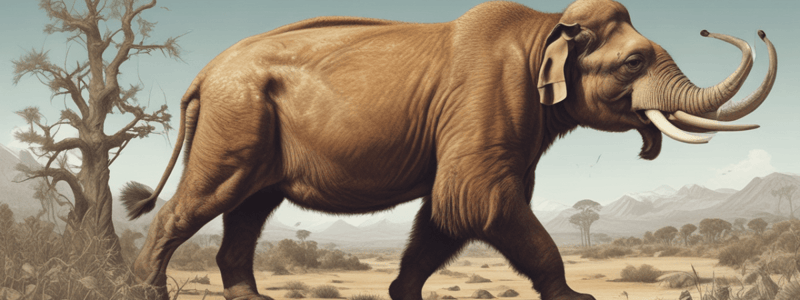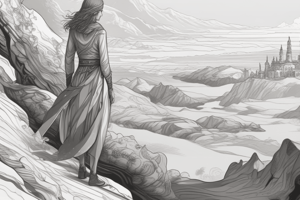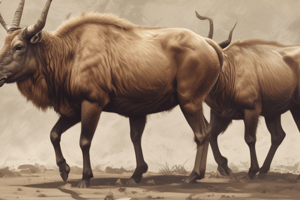Podcast
Questions and Answers
What is the function of the sebum secreted by sebaceous glands associated with hair roots?
What is the function of the sebum secreted by sebaceous glands associated with hair roots?
- To nourish the hair
- To change the color of hair
- To provide insulation
- To waterproof hair (correct)
What is the temperature of a monotreme's body?
What is the temperature of a monotreme's body?
- 37 degrees
- 35 degrees
- 32 degrees
- 30 degrees (correct)
What is the function of the placenta in mammalian development?
What is the function of the placenta in mammalian development?
- To produce milk for the baby
- To produce sebum for hair
- To regulate body temperature
- To provide oxygen and nutrients to the developing embryo (correct)
What is the characteristic of the jaw articulation in modern mammals?
What is the characteristic of the jaw articulation in modern mammals?
What is the function of the mammary glands in mammalian mothers?
What is the function of the mammary glands in mammalian mothers?
What is the characteristic of the lower jaw in modern mammals?
What is the characteristic of the lower jaw in modern mammals?
What is the function of the quadrate and articular bones in modern mammals?
What is the function of the quadrate and articular bones in modern mammals?
What is the characteristic of hair in mammals?
What is the characteristic of hair in mammals?
What is the benefit of the new jaw attachments in modern mammals?
What is the benefit of the new jaw attachments in modern mammals?
What is the characteristic of the subclass Theria?
What is the characteristic of the subclass Theria?
What is the primary function of the alpha keratin protein in mammals?
What is the primary function of the alpha keratin protein in mammals?
What is the primary difference between the body temperatures of monotremes and placentals?
What is the primary difference between the body temperatures of monotremes and placentals?
What is the purpose of the umbilical cord in mammalian development?
What is the purpose of the umbilical cord in mammalian development?
What is the result of the quadrate and articular bones losing their function in jaw articulation?
What is the result of the quadrate and articular bones losing their function in jaw articulation?
What is the characteristic of the hair found in mammals?
What is the characteristic of the hair found in mammals?
What is the primary function of the squamosal and dentary bones in modern mammals?
What is the primary function of the squamosal and dentary bones in modern mammals?
What is the primary difference between the jaw articulation of modern mammals and that of reptiles and amphibians?
What is the primary difference between the jaw articulation of modern mammals and that of reptiles and amphibians?
What is the benefit of the modification of hair in mammals?
What is the benefit of the modification of hair in mammals?
What is the characteristic of the subclass Prototheria?
What is the characteristic of the subclass Prototheria?
What is the primary function of parental care in mammals?
What is the primary function of parental care in mammals?
Flashcards are hidden until you start studying
Study Notes
Mammalian Classification
- Mammals are classified into subclass Prototheria (monotremes) and subclass Theria, which is further divided into infraclass Marsupialia (marsupials) and infraclass Placentalia (placentals/eutherians)
Mammalian Characteristics
- Mammals have hair made from the protein alpha keratin, which helps to insulate the body
- Endothermy allows for different body temperatures, e.g., monotremes (30°C), armadillos (32°C), marsupials and hedgehogs (35°C), humans (37°C), and rabbits and cats (39°C)
- Hair is often composed of guard and soft underfur and is waterproofed by sebum, the oily secretions of sebaceous glands associated with their roots
- Hair can be modified to serve various functions
Parental Care
- Mammalian mothers nourish their babies with milk produced from mammary glands
- Each baby in the uterus is attached via an umbilical cord to the placenta, which supplies oxygen and nutrients to the developing embryo
- Mammals have a longer gestation period compared to other animals
Skull and Jaw Evolution
- Modern mammals use the squamosal and dentary bones to make the connection between the skull and lower jaw
- The quadrate and articular bones, which were used in reptiles, amphibians, and earliest synapsids, have become smaller and migrated into the ear region, forming the 'hammer' and 'anvil' of the ear
- The new jaw attachments allow for greater digestion within the mouth, enabling a higher metabolic rate and maintenance of a high body temperature
Dental Characteristics
- Mammals have teeth that come in a variety of shapes and sizes, adapted for biting and chewing many kinds of food
- Mammals are diphyodontic, meaning they have two sets of teeth: milk/deciduous and adult
- Mammals are heterodontic, meaning their teeth are diversified in function, typically consisting of incisors, canines, premolars, and molars
Studying That Suits You
Use AI to generate personalized quizzes and flashcards to suit your learning preferences.




